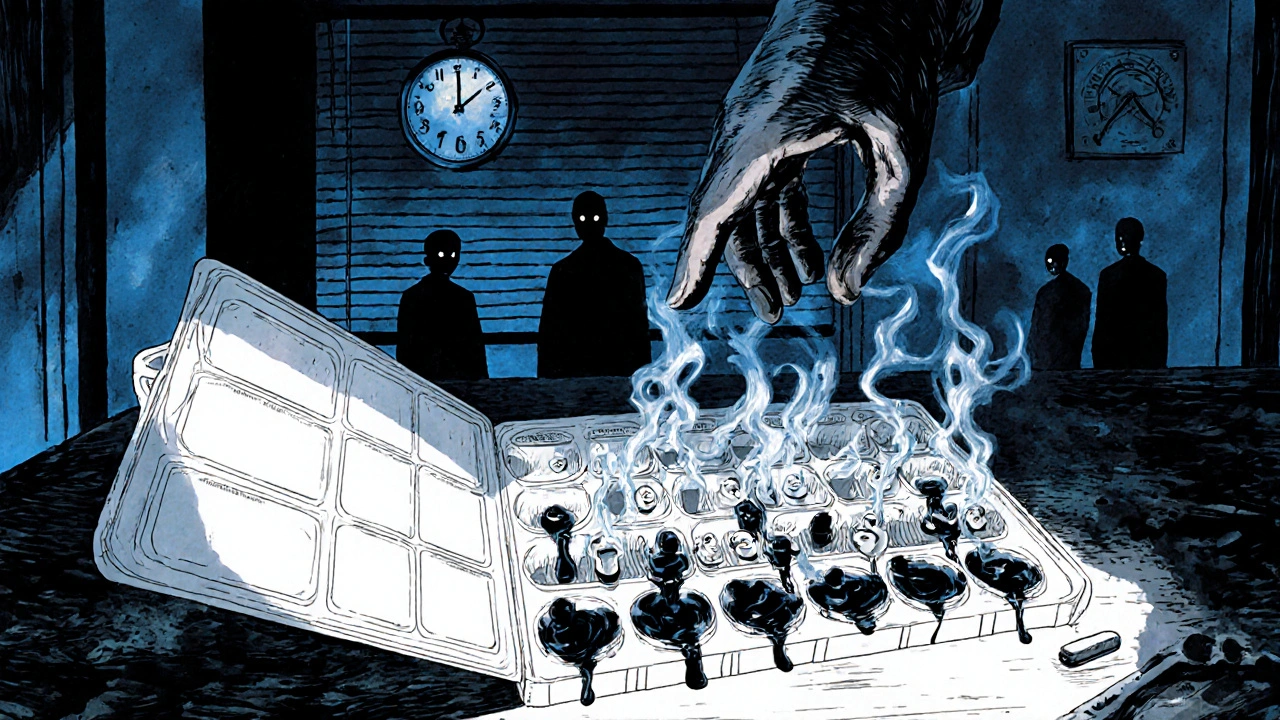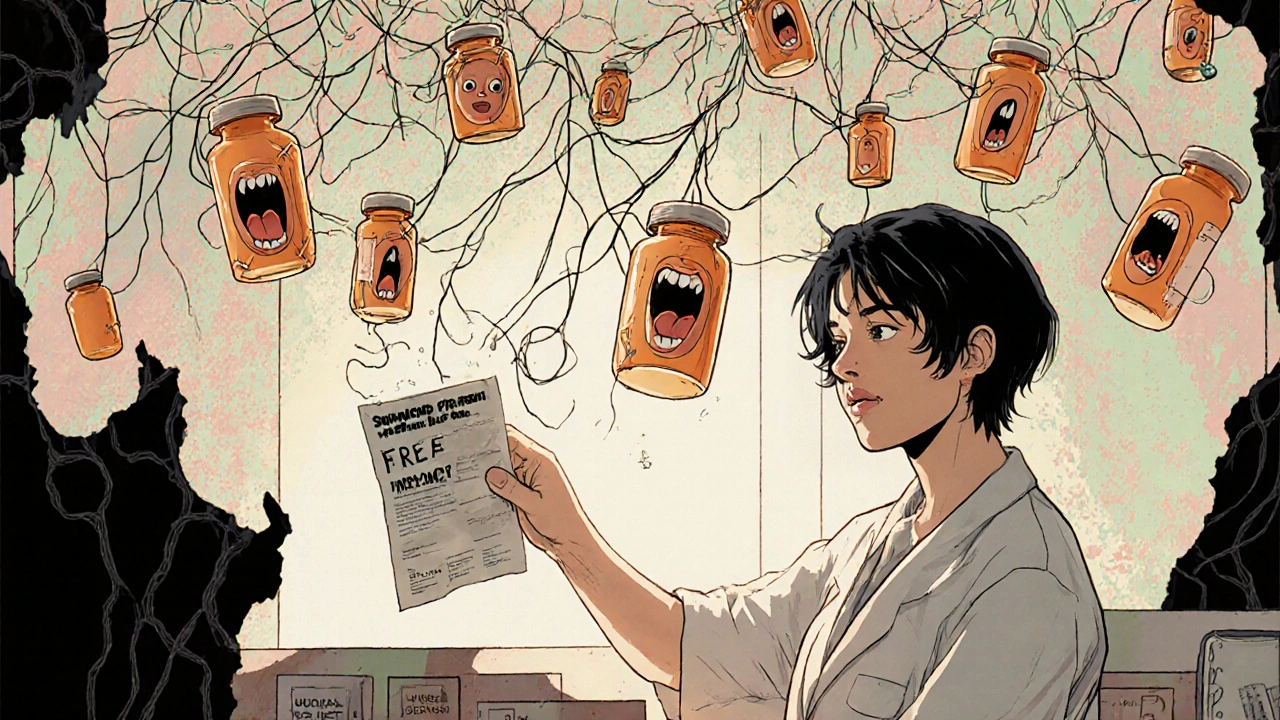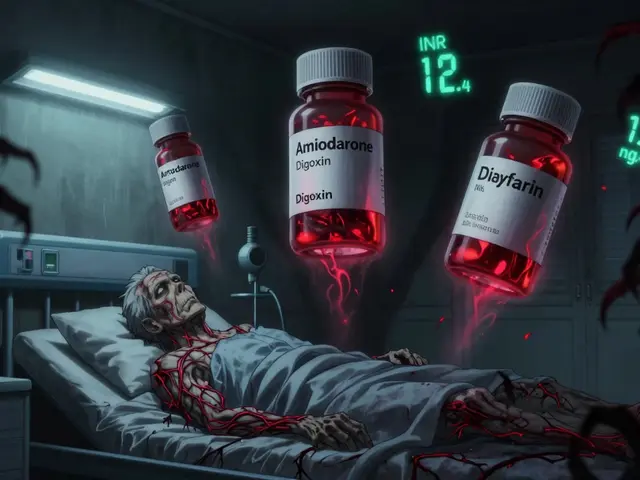Imagine this: you’ve been prescribed a new medication for high blood pressure. Your doctor says it’s life-changing. You fill the prescription. You take it for a week. Then the dizziness starts. The dry mouth. The weird taste in your mouth that won’t go away. You start skipping doses. Not because you don’t care-you do. But you’re scared. What if this gets worse? What if it’s not worth it?
You’re not alone. About 50% of people taking long-term medications don’t take them as prescribed. And side effects are one of the biggest reasons why.
Why Side Effects Stop People from Taking Their Medicine
It’s not laziness. It’s not forgetfulness. It’s often fear.
Studies show that up to 30% of patients stop their meds within the first few months-not because the drug doesn’t work, but because the side effects feel worse than the condition they’re treating. This is especially true for mental health meds, chronic pain drugs, and cholesterol-lowering pills. One study found that people with depression were twice as likely to skip their meds because of side effects-and once they started skipping, they often stopped all their medications, not just the one causing trouble.
Side effects don’t have to be severe to cause problems. A mild headache, a little nausea, or feeling tired after lunch can make someone think: Is this really worth it? Especially if they don’t feel sick to begin with. Statins, for example, are prescribed to lower cholesterol and prevent heart attacks. But if you’re feeling fine, why put up with muscle aches? The risk feels abstract. The side effect feels real.
And here’s the thing: many side effects aren’t even documented properly. Pharmacists are the least likely to record when a patient stops taking a drug because of side effects-only 52% of them do, compared to 85% of nurses. That means your doctor might not even know why you stopped.
The Real Cost of Skipping Doses
Skipping pills doesn’t just mean your condition doesn’t improve. It can make things worse.
In the U.S. alone, nonadherence leads to about 125,000 preventable deaths every year. That’s more than traffic accidents. It also causes up to 69% of medication-related hospitalizations. For people with diabetes, heart disease, or asthma, missing doses can trigger emergencies that could have been avoided.
And the money? It adds up fast. Each person who doesn’t take their meds as prescribed costs the system between $950 and $44,000 a year in extra care. But here’s the good news: when patients stick to their regimen, pharmacists can help save an average of $1,200 per person annually-just by helping them manage side effects and stay on track.
And it’s not just about saving money. Adherence rates of 80% or higher are needed for most chronic meds to work properly. If you’re taking your pill only 60% of the time, you’re not getting the benefit. You’re just risking side effects without the protection.
What Actually Works to Keep People on Track
Most pill organizers and phone alarms don’t fix the real problem. The issue isn’t just remembering. It’s feeling safe taking the medicine.
The most effective solutions don’t come from apps or reminders. They come from conversations.
One study showed that when pharmacists sat down with patients to talk through side effects-explaining what was normal, what wasn’t, and how to manage it-adherence jumped from 73.9% to 89.3%. That’s not a small change. That’s life-changing.
Face-to-face help works best. In-person counseling had an 83% success rate in improving adherence. Hospital discharge programs did well too (67%). Phone calls? Only 38%. That tells you something: people need to feel heard, not just reminded.
And it’s not just about talking. It’s about adjusting. If a pill causes nausea, maybe it can be taken with food. If it makes you sleepy, maybe it’s better at night. If it’s too expensive, maybe there’s a generic. If you’re on five pills a day, maybe some can be combined. These aren’t minor tweaks-they’re game-changers.

How to Talk to Your Doctor About Side Effects
You don’t have to suffer in silence. But you have to speak up.
Here’s how to have a productive conversation:
- Write it down. Before your appointment, list every side effect you’ve had-even if it seems small. Drowsiness? Dry mouth? Mood changes? Write it.
- Be specific. Don’t say, “It makes me feel weird.” Say, “I feel dizzy every afternoon around 3 p.m. and I’ve missed two work meetings because of it.”
- Ask for alternatives. “Is there another drug that might not cause this?” or “Can we lower the dose and see how I do?”
- Ask about timing. “Can I take this with food?” “Should I take it at night instead?”
- Ask about support. “Can I meet with the pharmacist to go over this?” Many pharmacies offer free med reviews.
Don’t wait until you’ve stopped taking it. Talk early. Talk often.
What You Can Do Right Now
You don’t need a perfect system. You need a practical one.
- Use a pillbox with days of the week. Fill it once a week. If you see a day empty, you’ll know you missed it.
- Link meds to a habit. Take your pill after brushing your teeth or with your morning coffee. Habit stacking works better than alarms.
- Keep a side effect journal. Use your phone notes. Write: “Date: Nov 15. Pill: Lisinopril. Side effect: Dry cough. Did I take it? Yes.” This helps you spot patterns.
- Ask your pharmacist for a med review. Most pharmacies offer this for free. They’ll check for interactions, simplify your regimen, and help you manage side effects.
- Don’t stop cold. If you’re thinking of quitting, call your doctor first. Some meds need to be tapered. Stopping suddenly can be dangerous.

The Bigger Picture: Why This Matters
Medication adherence isn’t just about you. It’s about the whole system.
Hospitals are overloaded. Emergency rooms are crowded. Insurance premiums keep rising. A lot of that is tied to people not taking their meds. When you stay on track, you help reduce those pressures. You avoid hospital visits. You stay out of the ER. You live longer, healthier.
And it’s getting smarter. New tools use AI to predict who’s at risk of quitting meds because of side effects. Then, pharmacists reach out before the patient even stops. That’s the future-and it’s already here in some clinics.
But none of it matters if you don’t feel safe taking your medicine. That’s why the best solution isn’t tech. It’s trust. It’s listening. It’s someone saying, “I hear you. Let’s fix this together.”
When to Get Help
Some side effects are serious. If you experience any of these, call your doctor right away:
- Swelling in your face, lips, or throat
- Difficulty breathing
- Severe rash or peeling skin
- Unexplained bruising or bleeding
- Thoughts of self-harm or suicide
- Severe dizziness or fainting
For less urgent side effects-nausea, fatigue, dry mouth, mild headaches-don’t wait. Call your pharmacist. They’re trained to help you manage these without stopping your treatment.
Why do people stop taking their medication even when they know it’s important?
People often stop because side effects feel more immediate and real than the long-term risk of their condition. If you’re taking a pill for high blood pressure but feel fine, the dizziness or dry mouth from the drug can seem worse than the silent danger of untreated hypertension. Fear, lack of communication with providers, and not knowing how to manage side effects all play a role.
Can side effects go away over time?
Yes, many do. Nausea, drowsiness, and headaches from new medications often fade after a week or two as your body adjusts. But not all do. If a side effect persists beyond two weeks-or gets worse-you should talk to your doctor or pharmacist. Don’t assume it’ll just go away.
Is it safe to skip a dose if I feel worse after taking it?
Never skip or stop a medication without talking to your provider first. Some drugs can cause rebound effects-like sudden spikes in blood pressure or seizures-if stopped abruptly. Even if you feel worse, your doctor may be able to adjust the dose, timing, or switch you to a different drug that’s better tolerated.
How can a pharmacist help me with side effects?
Pharmacists can help you understand what side effects are normal, suggest ways to manage them (like taking the pill with food), check for drug interactions, simplify your regimen, and even contact your doctor to request a change. Many offer free med reviews-no appointment needed.
Are there medications with fewer side effects?
Often, yes. For many conditions-like high blood pressure, depression, or cholesterol-there are multiple drug classes available. One might cause a cough, another might cause weight gain, another might cause dizziness. Your doctor or pharmacist can help find one that matches your body and lifestyle better.
Does insurance cover help with medication adherence?
Many Medicare Advantage and private plans now cover pharmacist-led adherence programs, especially for chronic conditions like diabetes, heart disease, and asthma. These services include med reviews, side effect management, and refill reminders-all at no extra cost to you. Ask your pharmacy or insurance provider.
Final Thought: You’re Not Failing-The System Might Be
Sticking to a medication plan isn’t about willpower. It’s about support. If you’ve struggled to take your pills, it’s not because you’re lazy or careless. It’s because the system hasn’t been designed to help you live with side effects-it’s been designed to hand you a prescription and hope for the best.
But you can change that. Talk to your pharmacist. Write down your side effects. Ask for alternatives. You don’t have to suffer to stay healthy. There’s a way to take your meds and feel better-not worse. And you deserve that.






10 Comments
Manjistha Roy
November 22, 2025 AT 15:46 PMSide effects aren't just physical-they're emotional too. I've seen patients cry because they feel guilty for stopping their meds, like they've failed somehow. But the truth? The system failed them first. No one asked how the dry mouth made them feel like they couldn't enjoy their morning coffee. No one asked if the dizziness made them afraid to walk the dog. We treat meds like checkboxes, not human experiences.
JD Mette
November 23, 2025 AT 22:52 PMMy dad stopped his statins because of muscle pain. He didn’t tell his doctor for six months. When he finally did, they switched him to ezetimibe and he’s been fine since. The key? He didn’t feel judged when he spoke up. Doctors need to ask ‘What’s the worst part?’ not ‘Why aren’t you taking it?’
Kane Ren
November 24, 2025 AT 08:16 AMYou’re not alone. I was on antidepressants for a year and skipped doses for months because of the brain zaps. I thought I was weak. Turns out, my doctor had no idea. When I finally told her, she adjusted the dose and added a tiny bit of therapy. Life changed. It’s not about willpower. It’s about being heard.
Javier Rain
November 24, 2025 AT 17:12 PMStop blaming patients. Start fixing the system. Pharmacies should have mandatory 10-minute med reviews after the first refill. Not optional. Not ‘if you ask.’ Mandatory. And pay pharmacists to do it. They’re the real frontline. They see you every time you walk in. They know your name. They know your routine. They’re the ones who can catch the drop before it becomes a crash.
Dalton Adams
November 26, 2025 AT 15:36 PMLet’s be real-most people don’t take meds because they’re lazy, not because side effects are bad. I’ve seen patients who take 14 pills a day and still skip 30% of them. They don’t care. They think ‘I feel fine’ means ‘I’m fine.’ But here’s the thing: if you’re on a statin and your cholesterol is 180, you’re not fine. You’re just lucky. And you’re gambling with your life. No amount of ‘I hear you’ changes the math.
Also, pharmacists? Most of them don’t know what they’re talking about. I’ve had them tell me to ‘take it with food’ for a drug that’s absorbed better on an empty stomach. That’s not help. That’s dangerous.
And don’t get me started on ‘habit stacking.’ Brushing teeth? Really? That’s your solution? You need structure, not cute hacks. You need accountability. You need consequences. Not empathy. Not ‘let’s fix this together.’
Stop romanticizing nonadherence. It’s not a trauma response. It’s negligence. And we’re paying for it with 125,000 dead people a year. That’s not a policy problem. That’s a personal failure. And someone’s got to say it.
Karla Morales
November 26, 2025 AT 17:48 PM😭 I used to be one of those people. Took my blood pressure med for 3 days, then stopped because I felt ‘numb.’ Didn’t tell anyone. Thought I was being strong. Then I had a mini-stroke at 38. Turned out my BP was 190/110. No symptoms before. Just silent. Now I take my meds. Every. Single. Day. And I cry sometimes because I’m so angry I didn’t listen sooner. Don’t wait for your body to break before you ask for help. You deserve to feel like yourself-not like a zombie, not like a statistic.
Henrik Stacke
November 27, 2025 AT 22:18 PMAs someone who grew up in the UK where the NHS treats medication adherence as a public health priority-not a personal failing-I can say this: the American system is broken. We have pharmacists trained in adherence counseling, free med reviews, and community health workers who follow up. Here? You get a prescription and a shrug. I moved to the States last year. I was shocked. No one asks if you’re struggling. No one checks in. It’s like they hand you a bomb and say, ‘Don’t drop it.’
My mum’s on warfarin. She’s 72. She has a pillbox, a phone alarm, and a nurse who calls her every Thursday. That’s it. That’s all it takes. And it works. Why can’t we do that here?
It’s not about willpower. It’s about infrastructure. And we’re not building it.
Olanrewaju Jeph
November 28, 2025 AT 00:29 AMThere is a critical gap in the literature regarding cultural influences on medication adherence. In Nigeria, for example, many patients consult traditional healers before or alongside biomedical treatment. This is not defiance-it is pluralistic healthcare navigation. Yet, Western clinical models often pathologize this behavior. A patient who takes their antihypertensive after a spiritual cleansing is not nonadherent-he is integrating care. We must stop viewing cultural practices as barriers and start viewing them as entry points for dialogue. The solution is not to eliminate alternative medicine, but to bridge it with pharmacology through culturally competent providers.
Additionally, the term 'side effects' is itself a product of biomedical hegemony. In many African languages, there is no direct translation. People describe symptoms as 'the medicine fighting with my body' or 'the drug is too strong for my spirit.' Language shapes perception. If we cannot speak to patients in their own conceptual frameworks, we will never gain their trust.
Moreover, the cost of medication is not merely financial. It is psychological. The shame of being seen at the pharmacy every month. The stigma of being labeled 'chronic.' The fear that your children will inherit your condition. These are not trivial concerns. They are existential burdens. And no pillbox can fix them.
So yes, talk to your pharmacist. But also demand systemic change. Demand that your insurance cover counseling. Demand that your doctor ask, 'What does this medicine cost you?'-not just 'Do you take it?'
Charmaine Barcelon
November 28, 2025 AT 07:26 AMUgh. So many people just give up. Like it’s okay to stop meds because you don’t like the taste? You think your life is a Netflix show? You don’t get to pick and choose when you’re healthy. Your body doesn’t care how you feel. It just does what it’s supposed to do. If you’re too lazy to take a pill, don’t blame the system. Blame yourself. And stop pretending you’re a victim. You’re not. You’re just weak.
Jennifer Skolney
November 29, 2025 AT 14:25 PMI’m a nurse. I’ve seen this every day. One of my patients, 68, stopped her diabetes meds because they made her dizzy. She fell. Broke her hip. Spent 3 months in rehab. She told me, ‘I didn’t think it was that serious.’ I said, ‘It’s not about serious. It’s about silent.’
Here’s what works: I gave her a small notebook. Every time she took her pill, she wrote ‘took it.’ Every time she skipped, she wrote ‘skipped.’ No judgment. Just tracking. After two weeks, she saw the pattern. She didn’t even realize she was skipping every other day. She started taking it again. No new meds. No fancy app. Just awareness.
And guess what? She’s now walking again. With a cane. But she’s walking.
It’s not about willpower. It’s about seeing the truth. And sometimes, all we need is a little help seeing it.